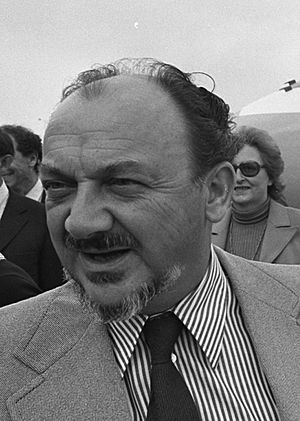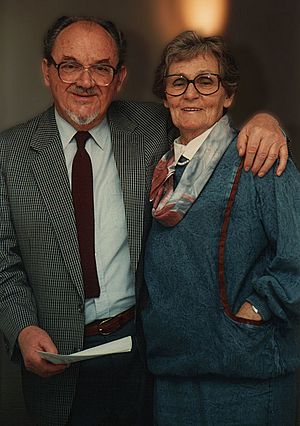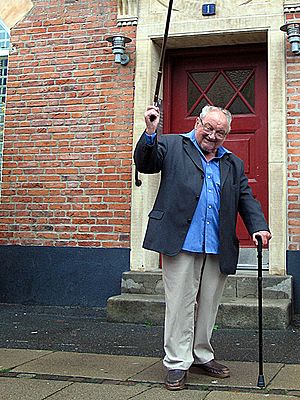Anker Jørgensen facts for kids
Quick facts for kids
Anker Jørgensen
|
|
|---|---|

Jørgensen in 1975.
|
|
| 20th Prime Minister of Denmark | |
| In office 5 October 1972 – 19 December 1973 |
|
| Monarch | Margrethe II |
| Preceded by | Jens Otto Krag |
| Succeeded by | Poul Hartling |
| In office 13 February 1975 – 10 September 1982 |
|
| Monarch | Margrethe II |
| Preceded by | Poul Hartling |
| Succeeded by | Poul Schlüter |
| President of the Nordic Council | |
| In office 1 January 1986 – 31 December 1986 |
|
| Preceded by | Páll Pétursson |
| Succeeded by | Elsi Hetemäki-Olander |
| In office 1 January 1991 – 31 December 1991 |
|
| Preceded by | Páll Pétursson |
| Succeeded by | Ilkka Suominen |
| Minister of Foreign Affairs | |
| In office 1 July 1978 – 30 August 1978 |
|
| Prime Minister | Himself |
| Preceded by | K. B. Andersen |
| Succeeded by | Henning Christophersen |
| Personal details | |
| Born |
Anker Henrik Jørgensen
13 July 1922 Copenhagen, Denmark |
| Died | 20 March 2016 (aged 93) Copenhagen, Denmark |
| Political party | Social Democrats |
| Spouse |
Ingrid Pedersen
(m. 1948; died 1997) |
| Children | 4 |
| Military service | |
| Allegiance | |
| Branch/service | |
| Years of service | 1943 |
| Unit | Guard Hussar Regiment |
| Battles/wars | World War II
|
Anker Henrik Jørgensen (born July 13, 1922 – died March 20, 2016) was an important Danish politician. He served as the Prime Minister of Denmark five times between 1972 and 1982. He was also the Minister of Foreign Affairs for a short time.
Jørgensen was known for being a very down-to-earth person. He chose to live in his small apartment in a working-class area of Copenhagen. He did not move into the official Prime Minister's residence. People in Denmark respected him for his honesty and simple way of life.
During his time as Prime Minister, he worked hard to keep Denmark's strong welfare state. This means the government helps its citizens with things like healthcare and education. In 1990, he even traveled to Iraq to help free some Danish people who were being held hostage.
Contents
Early Life and World War II
Anker Henrik Jørgensen was born in Copenhagen, Denmark. Sadly, both of his parents died when he was a child. He was then raised by other family members. He went to school but left after the 7th grade to start working. He got a job in a warehouse.
Working in the warehouse led him to join a trade union. A trade union is a group that helps workers get fair pay and good working conditions. He also became active in the Social Democratic party.
In 1943, during World War II, Anker Jørgensen served in the Danish military. He was part of the Guard Hussar Regiment. He was involved in fighting when the Germans attacked his barracks during an event called Operation Safari. After this, he joined the Danish resistance movement in Copenhagen. This group secretly fought against the German occupation.
Political Journey
Starting in Politics
Anker Jørgensen began his political career early. In 1950, he became a member of a trade union. He later became the leader of the Danish General Workers' Union from 1968 to 1972.
While leading the union, he was elected to the Parliament of Denmark in 1964. The Folketing is Denmark's main law-making body. In parliament, he focused on issues related to workers. He often spoke up for people who did not have special skills or who were jobless. He also openly criticized the Vietnam War.
Before Denmark voted on joining the European Economic Community (EEC) in 1972, Jørgensen supported joining. The EEC was a group of European countries working together on trade and economy. This was a big decision for Denmark.
Becoming Prime Minister
Just one day after the EEC vote, Anker Jørgensen became the Prime Minister of Denmark. He held this important job for 14 months. After an election in 1973, he was replaced by Poul Hartling.
After a little over a year, he became Prime Minister again in 1975. This time, he led a government where his party did not have the most seats. In 1978, he formed a larger government by including another party, the Liberals. This was done to help with economic problems. During this time, he was also the Foreign Minister for two months.
He continued to lead a Social Democratic government until 1982. He stepped down as Prime Minister without calling an election. He was replaced by Poul Schlüter. Jørgensen remained the leader of the Social Democrats until 1987. He stayed a member of parliament until 1994.
During his time as Prime Minister, Denmark joined the EEC. He also helped develop Denmark's social and welfare systems even more. These systems provide support for citizens.
Many new social reforms were introduced when Jørgensen was Prime Minister. For example, a new law in 1975 made it easier to get social benefits. A law in 1979 increased the number of paid holidays to 30 days. Laws were also passed to help unemployed people and improve housing conditions.
Later Years
Anker Jørgensen was the President of the Nordic Council in 1986 and 1991. The Nordic Council is a group that helps countries in the Nordic region work together.
In 1990, he was named "Dane Of The Year" in a survey. He was also an Honorary President of the Socialist International, a worldwide group of socialist parties.
Anker Jørgensen passed away on March 20, 2016, at the age of 93. His funeral was held on April 2, 2016.
Family Life
In 1948, Anker Jørgensen married Ingrid Kvist Pedersen. They were married until her death in 1997. They had four children together. For almost 50 years, he lived with his family in the Sydhavnen area of Copenhagen. This was a working-class neighborhood. In 2008, when he was 86 years old, he moved to a center for elderly care.
Awards and Recognition
Anker Jørgensen received several awards for his work and contributions:
- 1970 Poul Henningsen prize, PH-prisen
- 1974 Received the Mathildepris by the Danish Women's Association
- 1991 Received the Drassows Legat
- 1993 Received the Jytte-prize
- 1994 Received the Cultural prize by the Danish Confederation of Trade Unions
- 2007 A tribute album called De største er de små - sange til Anker (The Small Ones are the Greatest – Songs for Anker) was released by various artists.
- 2007 Became an Honorary member of the Social Democratic Youth of Denmark
See also
 In Spanish: Anker Jørgensen para niños
In Spanish: Anker Jørgensen para niños
 | Kyle Baker |
 | Joseph Yoakum |
 | Laura Wheeler Waring |
 | Henry Ossawa Tanner |



